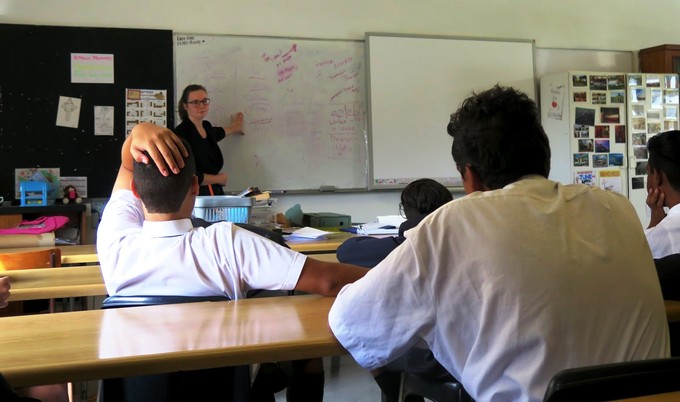Airing sex and power in the classroom
Gender and Sex Project fills the vacuum left by many Life Orientation classes
“The doctor sees a penis and Y chromosomes [when you are born] and says, ‘It’s a boy!’” says Abigail Branford to the students in her class at Groote Schuur High School. But, she tells them, despite this declaration, your gender identity may differ from your biological sex.
Branford is president of the University of Cape Town branch of the Gender and Sex Project (GASP), teaching Life Orientation classes with a difference – providing sex education, explaining power relations in society, examining identity issues and describing the effects of socialisation to students in grades 10 and 11.
“Who is getting an easier deal than others?” Branford asks the class. She draws up two columns on the whiteboard – those who have more power and those who have less: men and women, heterosexuals and homosexuals. The students tell Branford rich people must also be in the column with more power.
“The Gender and Sex Project (GASP) is about re-imagining what Life Orientation could be,” says Branford.
She says, the Life Orientation school curriculum is often very different from what is actually spoken about in class, and the classes are typically not thought to be very useful to students.
But, says Branford, the result of not having these conversations can be unintended pregnancies, sexual violence and homophobic bullying.
Branford prefers to distance GASP from what Life Orientation is typically associated with, which she says is “dryness and textbooks and awkward videos from the 80s”.
“The ultimate aim is not for them to pass a test, it is for them to be able to navigate life.”
Branford began GASP in 2014 at Rhodes University and has continued the project at UCT while doing her honours degree there. GASP goes to various high schools, among them Groote Schuur, Oude Molen and Trafalgar High.
The facilitators for the sessions are mainly students who have all received training from the project before they teach any classes.
“Statistically in this country if you talk about consent and sexual violence there is going to be someone in the class who is a survivor, and you as a facilitator might be the first person to bring this up and to bring it up in a way that isn’t victim blaming, that isn’t incredibly conservative or patriarchal,” says Branford.
If someone discloses that they are a survivor in class, the facilitator needs to be prepared.
Nompilo Sibisi, a facilitator, says that much of what people do is ingrained in them and GASP classes challenge this. “For a lot of people it is the first time they are starting to think about it [the sex, identity and gender issues GASP covers],” explains Sibisi.
She believes it is especially important for teenagers as they are forming their identity.
“When you are struggling … and you see someone who is close to your age talking about these things and being okay with talking about these things … it is really important,” says Sibisi. “It’s not someone who is coming in as a teacher who is saying that it is okay … If you find someone who you identify with, someone from your place, your colour and your identity, and they are okay, it is very affirming.”
Another facilitator, Eli Block, says the classes teach students to respect one another. “When people aren’t knowledgeable about why someone might not fall into the gender that they were born with, they laugh about it … We don’t want people to be discriminated against just because of what they feel and how they think. They need to [be free to] express themselves,” says Block.
Next: Tough questions for Eskom after electrocution of nine-year-old
Previous: From Xolobeni to Marikana we see consequences of impunity
© 2016 GroundUp. 
This article is licensed under a Creative Commons Attribution-NoDerivatives 4.0 International License.
You may republish this article, so long as you credit the authors and GroundUp, and do not change the text. Please include a link back to the original article.



